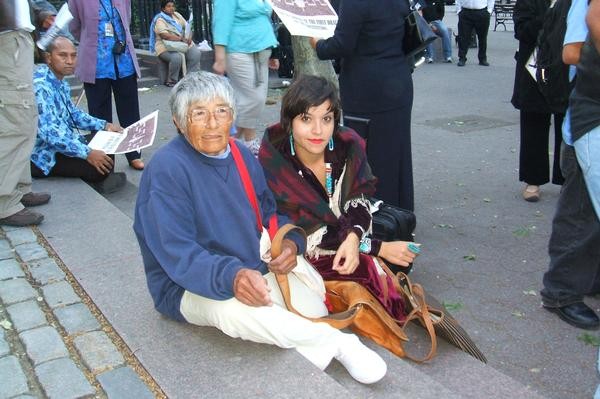| Brenda Norrell: United Nations calls for second Indigenous Border Summit
NEW YORK -- The Indigenous Border Summit of the Americas, held in San Xavier on Tohono O'odham land in Arizona, was so successful that the United Nations Permanent Forum on Indigenous Issues is calling for a second Border Summit.
Tony Gonzales, field representative for the International Indian Treaty Council, said the Border Summit is having far-reaching global impacts.
"As the United Nations Permanent Forum on Indigenous Issues VI came to an end, I am glad to inform you that it too recommended the call for another International Border Summit", Gonzales said.
"Migration and development, border deaths and conflict, border crossing and ID use and displacement of whole communities apparently is coming under scrutiny. It is emerging as a hot topic in the halls of the United Nations and gathering movement - and the global search for solutions."
In New York, the Permanent Forum priorities were the protection of intellectual and traditional property rights, safeguarding genetic integrity, climate change and border issues.
The Border Summit of the Americas, organized by Mike Flores, Tohono O'odham, with support from the International Indian Treaty Council, in 2006, issued a proclamation of Indigenous border rights. The proclamation called for an end to the militarization of borders and a halt to the harassment of Indigenous Peoples crossing borders. The declaration opposed the construction of a U.S. and Mexico border wall that would dissect O'odham communities and violate an O'odham ceremonial route.
The summit gathered testimony from those who are living in the border region, including victims of the military and border agents and those struggling to uphold human rights. The summit brought together in solidarity Mohawk from the north with Indigenous from the southern border.
Gonzales said the Border Summit received endorsement from the United Nations at the preparatory session in April, then again in May from the Forum.
"The preparatory meeting held in mid-April 2007, in Minneapolis, in the presence of Willie Little Child, UN Permanent Forum member, endorsed the Border Summit including, the San Xavier District Declaration and recommended in their report the support of another such effort to the UN Permanent Forum."
A site has not yet been selected for the second Border Summit.
The United Nations said that Indigenous leaders wrapped up the annual session of the United Nations Permanent Forum on Indigenous Issues with a series of recommendations calling on Member States to take steps to protect their rights to lands, territories and natural resources.
Participants urged countries to adopt measures to halt "land alienation" in Indigenous territories – such as by imposing a moratorium on the sale and registration of land in areas that are occupied by Indigenous Peoples, according to the U.N. news release.
They also called for the world's estimated 370 million Indigenous Peoples to be given a central role in dispute-solving arrangements over the lands, territories and natural resources they occupy and use, as well as the right to receive information about these issues in a language they can understand.
During the two-week summit, recommendations included a call for financial and technical assistance so that Indigenous Peoples can map the boundaries of their communal lands, the imposition of penalties on those who carry out harmful activities on Indigenous lands, and the payment of compensation to Indigenous peoples as a result of such activities.
The recommendations are contained in the Forum's report, to be forwarded to the Economic and Social Council (ECOSOC), which stresses that territories, lands and natural resources are the sources of Indigenous Peoples' spiritual, cultural and social identity.
Victoria Tauli-Corpuz, Chairperson of the Permanent Forum, said that Indigenous People worldwide have long suffered discrimination over their entitlements to occupying and using lands and natural resources.
"One of the key reason why Indigenous Peoples are being disenfranchised from their lands and territories is the existence of discriminatory laws, policies and programmes that do not recognize Indigenous peoples' land tenure systems and give more priority to claims being put by corporations – both State and private", she said.
More than 1,500 Indigenous representatives attended the Forum's session. Next year's Forum will focus on the theme of climate change and there will also be sessions devoted to the Pacific region and to the protection of the thousands of threatened Indigenous languages.
By Brenda Norrell
Human Rights Editor
U.N. OBSERVER & International Report
Please also see:
Indigenous oppose Border Wall and Militarization
http://americas.irc-online.org/amcit/3648
United Nations Permanent Forum on Indigenous Issues http://www.un.org/esa/socdev/unpfii
International Indian Treaty Council http://www.treatycouncil.org
Western Shoshone Defense Project http://www.wsdp.org
To read reports on the Border Summit, please see:
http://bsnorrell.tripod.com
Also on the Censored blog:
Western Shoshone film, "Our Land, Our Life," wins People's Choice award at Mountainfilm fest in Telluride
Oglala Commemoration announcement for 2007
Commentary: 'Wounded Knee' end of Hollywood trail
Mohawk Nation News
News from the Zapatistas' Other Campaign in Northwest Mexico
Brenda Norrell
http://www.bsnorrell.blogspot.com
|

